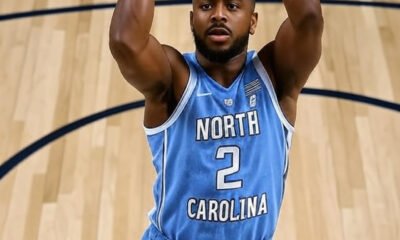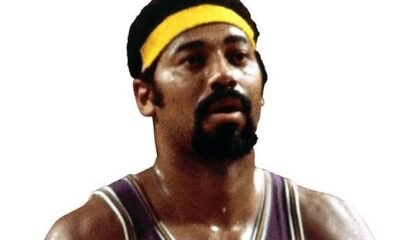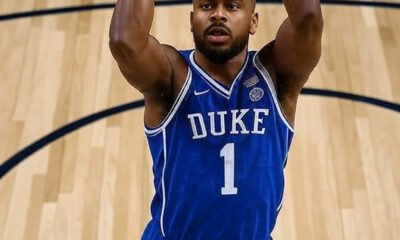Blog
Harris, No.1 Georgia Bulldogs target, stands 7-foot-tall committs to Oklahoma Sooners football over Georgia….
Harris, No.1 Georgia Bulldogs Target, Stands 7-Foot-Tall, Commits to Oklahoma Sooners Over Georgia
*In a surprising turn of events, towering basketball and football recruit Harris, once considered the top target for the Georgia Bulldogs, has committed to the Oklahoma Sooners, choosing college football over Georgia and other suitors.*
—
### Introduction
College football recruiting is an intricate dance of talent evaluation, strategic positioning, and regional loyalties. Each year, top prospects across the nation draw significant attention from major programs, with the battle often fierce and highly publicized. Among these prospects, a recent standout has captured headlines: Harris, a 7-foot-tall athlete who was initially regarded as Georgia’s No.1 target. His decision to commit to Oklahoma over Georgia has sent ripples through the recruiting landscape, prompting analysts and fans alike to analyze the factors behind this unexpected choice.
—
### The Player Profile: Harris – A Unique Talent
Harris is a rare athlete, standing at an imposing 7 feet tall with a versatile skill set that has made him a coveted recruit. His physical stature alone draws comparisons to some of the most dominant players in both basketball and football history. While many tall athletes excel on the court, Harris has demonstrated exceptional athleticism, agility, and coordination that suggest he could excel on the gridiron.
**Background and Athletic Profile:**
– **Height:** 7 feet (213 cm)
– **Weight:** Approximately 250 pounds (113 kg)
– **Position:** Primarily projected as a defensive lineman or tight end, with potential to contribute on both sides of the ball.
– **Athletic Attributes:** Exceptional reach, impressive agility for his size, quickness off the line of scrimmage, and a high motor.
– **Previous Sports Involvement:** Harris has showcased skills in basketball, where his height gives him an advantage, but recent focus has shifted toward football, where his physical attributes are highly desirable.
—
### Recruitment Journey: From Georgia to Oklahoma
Harris’s recruitment began early in his high school career, with Georgia, his home state university, emerging as a primary contender. The Georgia Bulldogs, renowned for their strong football program and regional ties, prioritized Harris due to his potential to bolster their defensive line and add a unique physical presence.
**Why Georgia Was the Favorite:**
– **Regional Proximity:** Georgia’s proximity to Harris’s hometown made it a convenient choice for family and local fans.
– **Program Fit:** Georgia’s emphasis on physical, aggressive defense aligned with Harris’s skill set.
– **Relationship Building:** Georgia coaches built strong rapports with Harris and his family, emphasizing their commitment to his development.
However, as the recruiting process unfolded, other programs, notably Oklahoma, began to make significant inroads.
**Oklahoma’s Approach:**
The Sooners, under head coach Brent Venables, have emphasized aggressive defense and athletic versatility. Oklahoma’s coaching staff showcased a vision for Harris as a game-changing presence on their defensive line or as a matchup nightmare on offense.
– **Development Potential:** Oklahoma’s reputation for developing versatile linemen and utilizing multi-dimensional athletes appealed to Harris.
– **Facilities and Resources:** State-of-the-art training facilities and a history of nurturing top-tier talent.
– **Off-field Opportunities:** Oklahoma’s community, academic programs, and lifestyle offerings played roles in Harris’s decision.
### The Turning Point: Why Harris Chose Oklahoma
While the specifics of Harris’s decision are known only to him and his close advisors, several factors likely contributed to his choice:
1. **Playing Style and Scheme Fit:**
Oklahoma’s defensive schemes are known for aggressive line play and innovative use of big athletes. Harris saw an opportunity to maximize his physical attributes in this system, potentially earning early playing time.
2. **Coaching Staff and Development:**
The Oklahoma coaching staff’s reputation for developing versatile linemen and tailoring training to individual strengths was appealing.
3. **Academic and Personal Considerations:**
Harris might have valued Oklahoma’s academic programs, campus environment, or personal connections that influenced his decision.
4. **Recruitment Dynamics:**
Despite Georgia’s efforts, Oklahoma’s persistence and tailored approach likely resonated with Harris. Additionally, national recruitment pressures and the desire to explore new opportunities might have played roles.
5. **Family and Personal Preferences:**
Family influence, comfort with the coaching staff, and a desire for a fresh start can heavily influence commitments, especially for a player with such a unique physical profile.
—
### Implications for Georgia and the Broader Recruiting Landscape
Harris’s commitment to Oklahoma over Georgia is more than a personal decision; it reflects broader trends in college recruiting.
**For Georgia:**
– **Recruiting Strategy Reevaluation:** Georgia may need to reassess how they approach highly coveted prospects, especially those with multiple regional options.
– **Talent Acquisition Focus:** The Bulldogs might intensify efforts to secure other top-tier recruits or develop existing talent to fill the gap.
**For Oklahoma:**
– **Recruiting Win:** Landing Harris signals Oklahoma’s rising status in recruiting circles, especially in regions traditionally dominated by SEC schools.
– **Program Advancement:** Harris’s commitment could be a catalyst for further recruiting success, attracting other elite athletes.
**For the Player:**
– **Development Expectations:** Harris will be expected to develop into a key contributor early in his college career, given his physical tools and the investment made.
– **Potential Impact:** His size and athleticism could revolutionize Oklahoma’s defensive line or offensive schemes, depending on where he lines up.
—
### Broader Context: The Dual-Sport Athlete and NCAA Considerations
Harris’s profile as a tall athlete skilled in multiple sports raises questions about NCAA rules regarding dual-sport athletes and recruiting.
– **Basketball vs. Football:** If Harris continues to excel in basketball, there could be considerations about eligibility or commitments to both sports, though most schools prefer athletes to focus on one sport at the collegiate level.
– **Eligibility and Recruitment Rules:** NCAA rules regarding recruiting, amateurism, and transfer policies can influence a player’s trajectory and decision-making.
—
### Future Outlook: Harris’s College and Professional Prospects
As Harris embarks on his college career at Oklahoma, the expectations are high. His physical tools give him a significant advantage, but success will depend on development, adaptation to the college game, and staying healthy.
**Potential Career Path:**
– **Immediate Impact:** With proper development, Harris could see playing time as a freshman or sophomore, especially given his unique size and athleticism.
– **NFL Prospects:** If he continues to develop, Harris has the potential to be a high NFL draft pick, especially if he refines his technique and leverages his physical gifts.
– **Post-College Opportunities:** His versatility and size could make him attractive for professional basketball or football, although NFL is more likely given his profile.
—
### The Broader Recruiting Trends: Power Shifts and Athlete Versatility
Harris’s decision underscores several key trends in college sports:
– **Heightened Competition:** Top recruits now have multiple high-profile options, leading to more complex decision-making.
– **Program Development:** Schools like Oklahoma are investing heavily in recruiting and athlete development, challenging traditional powerhouses.
– **Multi-Sport Athleticism:** Athletes with talents across multiple sports are increasingly sought after, reflecting a trend towards versatile athletes.
– **Regional vs. National Recruitment:** While regional ties remain influential, national recruiting has become more fluid, with players often exploring options across the country.
—
### Conclusion
Harris’s commitment to Oklahoma over Georgia marks a significant moment in college recruiting narratives. As a 7-foot-tall athlete with immense potential, his decision reflects evolving priorities among elite recruits—favoring program fit, development opportunities, and personal growth over traditional regional loyalties.
For Georgia, losing their No.1 target is a setback but also an opportunity to pivot and focus on other prospects. For Oklahoma, securing Harris signals their rising prominence in recruiting circles and their commitment to building a formidable roster.
Looking ahead, Harris’s journey will be one to watch closely. His physical gifts, combined with the right development environment, could see him rise quickly in college football and beyond. His story exemplifies the changing landscape of college athletics, where versatility, opportunity, and strategic choices shape the future of sports and athlete development.
-

 Arsenal2 years ago
Arsenal2 years agoSad News Arsenal ex player who is goal scorer confirmed dead this morning
-
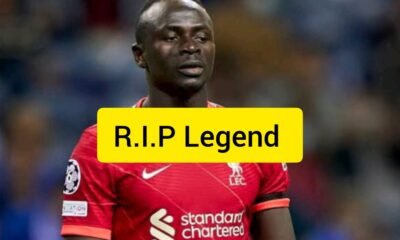
 Liverpool2 years ago
Liverpool2 years agoSad News Sadio Manè Confirmed Dead Today By Sky Sports Reporters, Open For Full Story 👇
-

 Blog1 year ago
Blog1 year ago“I was forcefully removed from Manchester United squad and now I’ve joined the best team in the world…I will revenge and as a result, I’ve ordered my friend who’s their best player currently to leave there with immediate effect and he has agreed”: Former Man United player angered by United decision to removed him from the squad as he ordered the Club’s best player to leave immediately.
-

 Blog1 year ago
Blog1 year agoSad News: Manchester United player died when playing for his country England yesterday 😢 😔
-

 Blog2 years ago
Blog2 years agoR.I.P: Formal Real Madrid and France international confirm death this morning
-

 Chelsea2 years ago
Chelsea2 years agoBreaking New:”Roman Abramovich could get Chelsea back”? Chelsea owner review the conversation between him and Roman Abramovich in. Deal about getting Chelsea back
-

 Blog2 years ago
Blog2 years agoUNBELIEVABLE: Manchester City midfielder KELVIN DE BRUYNE divorced wife this morning after DNA test revealed their 5 years old son belongs to formal Manchester United player
-
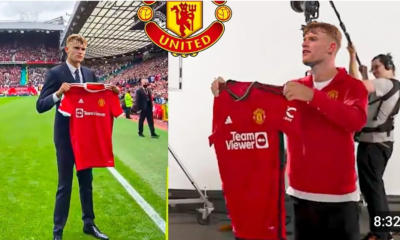
 Manchester United1 year ago
Manchester United1 year agoOFFICIAL NOW: Manchester United announce the signing of 23yr sensational player after beating Liverpool and Madrid for His signature, agreement reached on a 5yr deal, Medical completed – announcement ongoing



